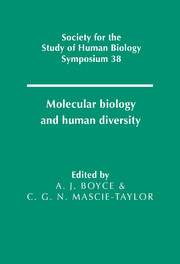Book contents
- Frontmatter
- Contents
- List of contributors
- Preface
- 1 Mitochondrial DNA in ancient and modern humans
- 2 Digital DNA typing of human paternal lineages
- 3 Minisatellites as tools for population genetic analysis
- 4 DNA fingerprinting: development of a technology and its application to the study of human populations
- 5 Kinship, inbreeding, and matching probabilities
- 6 Using the coalescent to interpret gene trees
- 7 Some attempts at measuring natural selection by malaria
- 8 AIDA: Geographical patterns of DNA diversity investigated by autocorrelation statistics
- 9 Mitochondrial DNA sequences in Europe: an insight into population history
- 10 Palaeolithic and neolithic contributions to the European mitochondrial gene pool
- 11 The molecular diversity of the Niokholo Mandenkalu from Eastern Senegal: an insight into West Africa genetic history
- 12 The peopling of Madagascar
- 13 Molecular perspectives on the colonisation of the Pacific
- 14 Population ancestry on Tristan da Cunha–the evidence of the individual
- 15 Linguistic divergence and genetic evolution: a molecular perspective from the New World
- 16 Allelic sequence diversity at the human β-globin locus
- 17 A nuclear perspective on human evolution
- 18 Contrasting gene trees and population trees of the evolution of modern humans
- 19 Methods and models for understanding human diversity
- Index
16 - Allelic sequence diversity at the human β-globin locus
Published online by Cambridge University Press: 19 September 2009
- Frontmatter
- Contents
- List of contributors
- Preface
- 1 Mitochondrial DNA in ancient and modern humans
- 2 Digital DNA typing of human paternal lineages
- 3 Minisatellites as tools for population genetic analysis
- 4 DNA fingerprinting: development of a technology and its application to the study of human populations
- 5 Kinship, inbreeding, and matching probabilities
- 6 Using the coalescent to interpret gene trees
- 7 Some attempts at measuring natural selection by malaria
- 8 AIDA: Geographical patterns of DNA diversity investigated by autocorrelation statistics
- 9 Mitochondrial DNA sequences in Europe: an insight into population history
- 10 Palaeolithic and neolithic contributions to the European mitochondrial gene pool
- 11 The molecular diversity of the Niokholo Mandenkalu from Eastern Senegal: an insight into West Africa genetic history
- 12 The peopling of Madagascar
- 13 Molecular perspectives on the colonisation of the Pacific
- 14 Population ancestry on Tristan da Cunha–the evidence of the individual
- 15 Linguistic divergence and genetic evolution: a molecular perspective from the New World
- 16 Allelic sequence diversity at the human β-globin locus
- 17 A nuclear perspective on human evolution
- 18 Contrasting gene trees and population trees of the evolution of modern humans
- 19 Methods and models for understanding human diversity
- Index
Summary
Despite nearly 20 years of molecular genetic investigation of human polymorphism, relatively little is known about the nature of variation in the human genome. Only a handful of loci have been investigated in any detail, and most studies have relied on indirect methods for the detection of DNA-level variation, most notably surveys using infrequently-cutting restriction enzymes. DNA sequence analysis (Sanger, Nicklen & Coulson, 1977), the only method with the potential for identifying all nucleotide and length variation present in a given genomic region has been applied to the analysis of the maternally inherited, haploid mitochondrial (mt) DNA genome (e.g. Vigilant et al., 1991; Ruvolo et al., 1993) but not nuclear DNA loci. As a consequence, high resolution investigation of genetic variation has been confined to a small, and largely atypical, portion of the human genome.
There are many reasons why DNA sequence investigation of human nuclear loci has lagged behind equivalent analysis of mtDNA. Mitochondrial DNA is far easier to isolate and analyse than nuclear DNA and phylogenetic interpretation of the allelic variation found there is simplified by the absence of interallelic recombination and gene conversion. Nuclear DNA is not only subject to the (potentially confounding) effects of recombination, it also contains fewer variable nucleotide sites than mtDNA due to its approximately ten-fold lower rate of point mutation (Cann, Stoneking & Wilson, 1987).
- Type
- Chapter
- Information
- Molecular Biology and Human Diversity , pp. 225 - 241Publisher: Cambridge University PressPrint publication year: 1996
- 2
- Cited by

